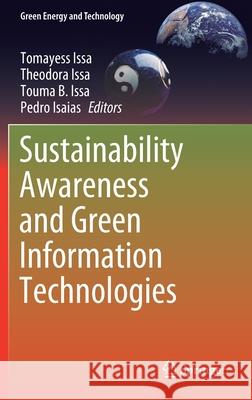Sustainability Awareness and Green Information Technologies » książka



Sustainability Awareness and Green Information Technologies
ISBN-13: 9783030479749 / Angielski / Twarda / 2020 / 554 str.
Sustainability Awareness and Green Information Technologies
ISBN-13: 9783030479749 / Angielski / Twarda / 2020 / 554 str.
(netto: 383,36 VAT: 5%)
Najniższa cena z 30 dni: 385,52
ok. 16-18 dni roboczych.
Darmowa dostawa!
• What is Sustainability?
o History of Sustainability
o Sustainable development goals of United Nation
o Triple Bottom Line
o CSR (Corporate Social Responsibility)
o Current progress level of sustainability according to United Nations conferences
o UN Sustainable Development Goals
• Sustainability Awareness and Importance among individuals and organizations in developed and developing countries
• Green IT Strategies and Models
o Green IT Models
Developed
Developing
o Green IT Models and Governance
o Green IT Models and Information Technology
o Green IT Models and Social and Cultural
o Green IT Models and Green Management
o Green IT Models and Performance Management
• Green IT Technologies
o Virtualization;
o Cloud Computing;
o Social Networking;
o Smart technology;
o Blockchain,
o Drones,
o Robots,
o IoT (internet –of-things);
o 3D Printing,
o AR (augmented reality);
o VR (Virtual Reality),
o Artificial Intelligence (AI)
o and Big Data.
Tomayess Issa is a senior lecturer at the School of Information Systems at Curtin University, Australia. Tomayess completed her doctoral research in Web development and Human Factors. As an academic, she is also interested in establishing teaching methods and styles to enhance the students’ learning experiences and resolve problems that students face. Tomayess Issa Conference and Program Co-Chair of the IADIS International Conference on Internet Technologies and Society and IADIS International Conference on International Higher Education. Furthermore, she initiated the IADIS conference for Sustainability, Green IT and Education. Currently, she conducts research locally and globally in information systems, Human-Computer Interaction, Usability, Social Networking, Teaching and Learning, Sustainability, Green IT and Cloud Computing. Tomayess participated in a couple of conferences and published her work in several peer-reviewed journals, books, book chapters, papers and research reports Tomayess Issa is a Project leader in the International research network (IRNet-EU (Jan 2014 – Dec 2017)) to study and develop new tools and methods for advanced pedagogical science in the field of ICT instruments, e-learning and intercultural competences and she is a senior research member of ISRLAb (Information Society Research Lab) from International Association for Development of the Information Society. Tomayess is a member of eLmL Steering Committee conference and member of the local committee of WWW2017 conference, and chair and Coordinator for the special track: SST2017: Sustainability and Smart Technology Workshop in WWW2017 conference. Furthermore, Tomayess is a senior research member in ISR-Lab and member in the International Association for Development of the Information Society) Scientific Advisory Board.
This book addresses several aspects of environmental sustainability awareness and priorization, explores ways to use resources and processes more responsibly, and describes the strategies, models and tools required to overcome various challenges. Sustainable and green IT are used to minimize the current ICT recycling problems which are harming our planet.
The book discusses the new green information technologies as alternatives to conventional ICT, which have significantly harmed nature, and examines how to make recent technologies such as cloud computing; social networking; smart technology; blockchains, IoT (internet-of-things); and big data sustainable.
Exploring sustainability awareness and importance among individuals and organizations in the developed and developing countries, most of the contributions conclude that sustainability should be considered a duty in order to change mindsets, attitudes and actions so as to preserve our planet. Furthermore, it examines the green information technology strategies and models.
1997-2026 DolnySlask.com Agencja Internetowa
KrainaKsiazek.PL - Księgarnia Internetowa









